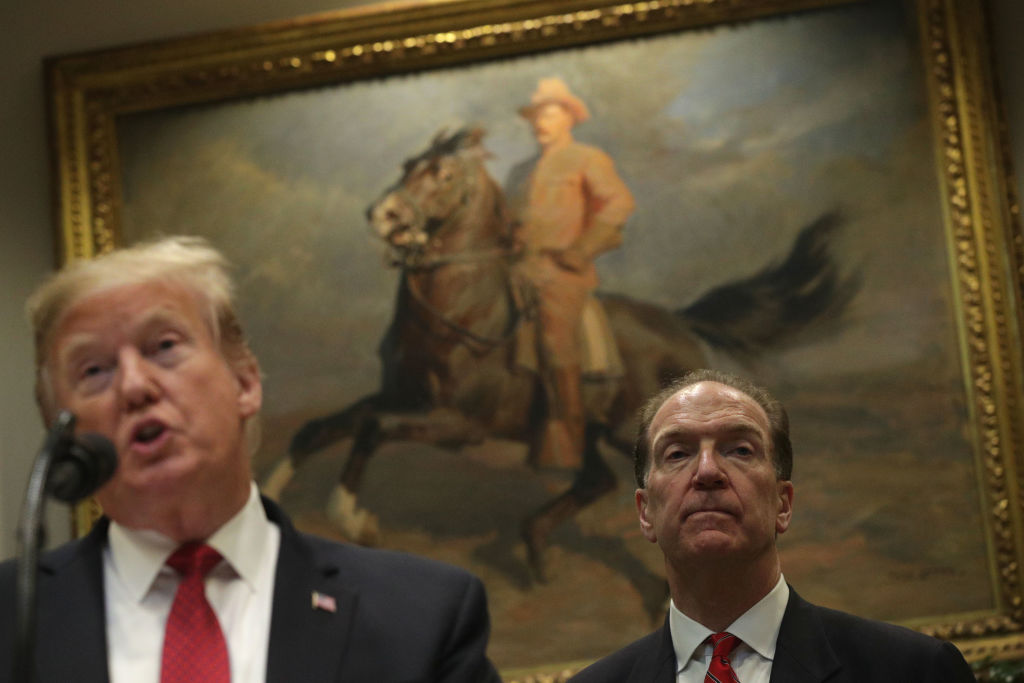
What Happened This Week:
U.S. President Donald Trump this week nominated David Malpass as World Bank president. The Treasury Department undersecretary for international affairs and former senior economic advisor to the Trump campaign has been a fierce critic of the institution. He will replace Jim Yong Kim, who resigned unexpectedly last month.
Why It Matters:
At the most elemental level, the nomination of Malpass matters because a person openly critical of the World Bank is now poised to head it, raising legitimate fears about what happens to one of multilateralism’s most storied and impactful institutions when it’s headed by an avowed critic of multilateralism.
The World Bank was established in 1944 with the purpose of leading the world’s fight against extreme poverty; it has done so over the last seven-plus decades by extending loans to low-income countries to fund projects at lower rates than if they were to go seek financing for those projects from international markets. Now, an organization that will be loaning upwards of $10 billion in just this fiscal year to some of the world’s most impoverished countries will be led by someone who may seek to undermine it.
The appointment also threatens a long-standing (albeit informal) agreement under which the U.S. appoints the head of the World Bank and Europe appoints the head of the International Monetary Fund (IMF). Criticism of the practice has been growing in recent years in favor of nominating people who actually hail from developing countries to these two posts. It’s a call that’s likely to grow louder if Malpass is confirmed.
Then there’s the China angle. Beijing is already looking to challenge the current international architecture—China’s Asian Infrastructure Investment Bank (AIIB) was established as a direct competitor to the Washington-based IMF and World Bank. More broadly, Beijing continues to use financial diplomacy to win allies for itself around the world, and without the stringent concessions that typically accompany World Bank financing and loans… all while being one of the World Bank’s biggest borrowers. It is something that many China hawks, as well as Malpass, have taken issue with in the past.
What Happens Next:
Malpass looks likely to be confirmed by the nation states that fund the Bank. The Europeans are too strongly attached to the informal ability to appoint the IMF head to put up much of a fight. In fact, some may see this as a guarantee of the IMF’s leadership for at least one more round — now that the U.S. will “owe” them for backing Malpass.
But Malpass’s successful nomination makes it all the more likely that whoever succeeds him will NOT be American. The Bank has been moving in that direction for years now; an unsuccessful and controversial stint by Malpass might be just the thing to push the Bank’s voting shareholders over the edge.
The Key Quote That Sums It All Up:
“[Malpass’] disdain for the World Bank’s mission of fighting global poverty rivals John Bolton’s respect for the United Nations.” Justin Sandefur, senior fellow at the Center for Global Development
The One Thing to Read About It:
Though it was published before Malpass was nominated, this Financial Times piece by former World Bank president Robert Zoellick explains why emerging markets are so critical to the world’s future — and why the next World Bank president needs to pay them particular attention. The global economy is a far different beast today than it was when the World Bank was first established in 1945.
The One Major Misconception About It:
That Malpass will look to burn the World Bank to the ground. Past colorful rhetoric aside, all signs suggest he will seek to reform an institution that has become a sprawling bureaucracy, rather than reduce it to ruins. If you look at congressional testimony Malpass gave last year, it seems he and the Trump administration have three main goals when it came to the administration’s dealings with the World Bank and IMF.
The first is to get emerging markets to start relying more on international market-based financing rather than the below-market-rate financing the Bank offers; the second is to make sure that money is lent for projects that are more financially sustainable; and third is to seek more debt transparency from countries receiving the loans in order to keep better tabs on the financial diplomacy China is pursuing around the world.
Expect Malpass to make progress towards these three goals rather than set about dismantling the organization completely.
The One Thing to Avoid Saying About It:
Malpass was the chief economist of Bear Stearns in 2007?!!? Talk about failing upwards.
More Must-Reads From TIME
- The 100 Most Influential People of 2024
- The Revolution of Yulia Navalnaya
- 6 Compliments That Land Every Time
- What's the Deal With the Bitcoin Halving?
- If You're Dating Right Now , You're Brave: Column
- The AI That Could Heal a Divided Internet
- Fallout Is a Brilliant Model for the Future of Video Game Adaptations
- Want Weekly Recs on What to Watch, Read, and More? Sign Up for Worth Your Time
Contact us at letters@time.com